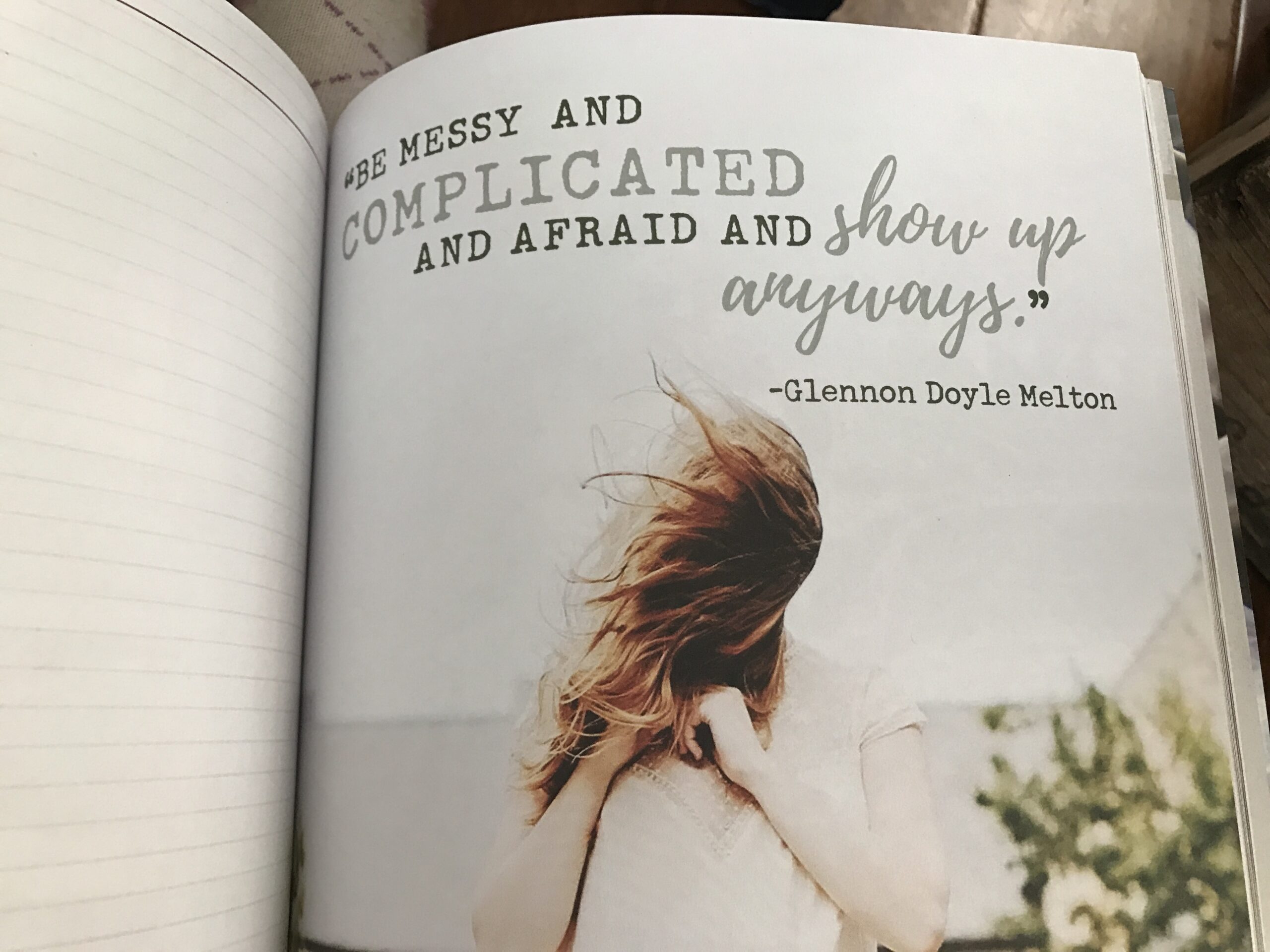“Excuses are merely nails used to build a house of failure.” -American Proverb
Excuses make one feel good in the moment for why one made the choice she did, but in reality they are growth-stunting words. Words create our choices.
When I was younger, and before I knew the full impact of words, I used to say whatever felt right at the moment. I was always stating “how busy I was” when it came to reasons I wasn’t involved, didn’t call, can’t (won’t is a better word) commit, etc. I would want to kick myself when I sat down to actually think about it. Am I that busy? Or was I saying I was that busy and then creating it? What did I really want? Was I saying this as an excuse? Absolutely. When my friends started saying things like, “I would have invited you, but you are so busy,” or “I didn’t want to bother you, because you are so busy,” I realized I had a problem with making excuses.
The truth is, I am a little busier than the average woman, having nearly eleven children, homeschooling, and running three businesses. However, I get the same daily allotment of time as everyone on the planet, and I get to chose to be master or victim to the hours of the day. When I really started honing in on this “busy-ness” I was creating and allowing, and made the decision to become mistress of my time, I loved the fact that I choose to make time or not make time for something in my life. It is empowering. When we become empowered through conscious choice, we then begin the process of weighing and balancing more carefully and more thoughtfully.
This, of course, is one example of choice and accountability vs. abdication of personal responsibility by excuse-making. We can find examples in all areas of our lives if one stops to assess mindfully.
Some of us are more experienced than others at excuse-making. Excuses come in all shapes and sizes and in all subjects. They are big and small. Some excuses are more elaborate than others, but they are all the same in their very nature…limitations and abdication of responsibility by the spoken word. The word creates belief, and sometimes vice versa, but by changing either you can change the pattern and the cycle of limitation.
Excuses are a way to hide your feelings of inadequacy and lack of commitment in change or progress. In short, they are as easy to speak as a white lie, are a close cousin to the lie, and inhibit you in a variety of ways. Here are nine reasons you should quit making excuses.
Excuses Focus on Failure
“Ninety-nine percent of the failures come from people who have the habit of making excuses.” ~George Washington Carver
We have two choices when faced with the reality that we did not do something or did it the wrong way. Admit it and decide to change or come up with reasons we fell short. When we make excuses we focus on our failing to achieve and then satisfy the reason we arrived at this point. It’s better to admit it and let it go. Excusing oneself takes up a lot of time and energy for a negative cause.
Excuses Spin Webs of Dishonesty
“An excuse is worse and more terrible than a lie; for an excuse is a lie guarded.” ~Alexander Pope
Honesty is the best policy, even if it’s with oneself. Do you catch yourself mentally going over a list of reasons you did or did not do something or behave in a certain way? Sometimes it helps to just say to oneself, “It is what it is and I’ll learn from it. It’s over, and now what are some ways I can change?” When excuses are made, they tend to be over-dramatized or exaggerated. If you feel the need to speak them to another, they also can be said with pride, anger, and frustration. It’s helpful to try to be objective about things, which is honesty. Admitting, “I was wrong in this area,” “that person or situation made it difficult,” “I felt offended or frustrated by…,” etc. can clear your mind of the excuse-making clutter. Honest assessment creates healthy resolutions and then makes it easier to set new goals.
Excuses thwart goals
“Don’t make excuses and don’t talk about it. Do it.” ~Melvyn Douglas
What good is a goal if when we can’t reach it we tell ourselves and everyone else all the reasons we didn’t or can’t achieve it? Read any book, listen to any talk, be around anyone who achieves and you’ll see that negative talk, excuse-making, and giving up tie together and stop any progression you were working towards. Don’t waste your precious time and energy talking about WHY, spend your time working out the HOW, and give yourself pep-talks to keep the motivation high. Energy goes where attention flows. Focus on excuses and you will always need to excuse yourself.
Excuses Lose You Respect
“A man must be big enough to admit his mistakes, smart enough to profit from them, and strong enough to correct them.” ~John C. Maxwell
One who is always making excuses and rarely progressing doesn’t truly respect herself. Self-respect comes when we are honest in our efforts and in our weakness. Self-respect comes when we do our best and admit when we didn’t and fell short. When one gets caught up in excuse-making it is because the person feels uncomfortable with themselves and their choices and so then spins a web of reasons it’s okay so one can go back to feeling comfortable inside. But, you can never truly feel comfortable when theirs this spore of dishonesty spreading within. Along with this lack of self-respect comes negative self-talk. When we don’t respect ourselves and live honestly, it is harder for others to respect you or trust your words. When someone promises they’ll go to the gym with you three times a week, and each morning you’re scheduled time to meet up arrives, and that person calls to tell you all the reasons they can’t, you can’t respect or trust them any longer. And, let’s be honest here, most of the reasons we excuse ourselves with are lame.
Creates habits of your Faults
“And oftentimes excusing of a fault doth make the fault the worse by the excuse.” ~William Shakespeare
Every single one of the seven billion people on this planet have faults. Its the nature of this earth-life. We don’t always recognize our own faults, but the more honest we are in self-assessment, the more we can see them and work on them. However, the more we excuse them away with phrases like, “That’s just who I am!”, or “It’s because I’m type 2 or orange color personality…”, or “It’s a Scottish thing, my ancestors gave it to me…” or any of the other silly reasoning we come up with, the more we continue in the rut of our habitual faults. The more we excuse it, the more we’re justifying that it’s okay to have this fault, and the more pronounced and acceptable to you it becomes. As Shakespeare says, “[it] doth make the fault the worse by the excuse.”
Excuses Blind: Is the heart really in it?
“Where the heart is willing it will find a thousand ways, but where it is unwilling it will find a thousand excuses.” ~Chotu Dhiman
In our effort to please others, or our eagerness to jump into something and not thinking it fully through, we may find ourselves in the heart of a situation we really don’t want. The sense of obligation comes when we worry more about what others think of us. Again, self-assessment is key here. Are we doing something half-hearted and that is the reason for failing or excusing ourselves? Are we caught up in feeling obligated to a commitment we aren’t truly ready for or truly want to do? Stop making excuses and gracefully bow out. Re-assess your goals for your life and family. Maybe the timing is just off. Forcing yourself to push forward sucks all the motivation and love out of a goal. Maybe you’re just trying to eat the whole elephant in one bite and you should be just starting in one area. Only you can answer these questions. But ask yourself, first, if your heart is truly in it. Then you can make the necessary changes and throw away the excuses.
Excuses Thwart True Repentance
“Never ruin an apology with an excuse.” ~Kimberly Johnson
If we feel the need to follow an apology with a “but” or “however”, we are not truly sorry. True sorrow brings about a change of heart. The change of heart brings about a change of goals and priorities. A change of goals and priorities brings about a happier and more fulfilled life because we let go of the “but baggage” and the “however hangers”. I’m sorry should end with a period and not a comma. Bring an abundance of happiness, change, success, and progression with true repentance.
Excuses Feeds Pride
“To rush into explanations is always a sign of weakness.” -Agatha Christie, The Seven Dials Mystery
Obadiah 1: 3 “The pride of thine heart hath deceived thee…” Pride is the root of all sin. It limits all of our progression and closes us off to personal inspiration and guidance. Excuses for why one can’t is simply feeding one’s pride and self-deception and blowing it out of proportion. Some people say that’s okay, because “ignorance is bliss!” I do not agree. Ignorance, self-deception, willful blindness, pride, are all extremely limiting and a cause of great unhappiness in one’s life. It’s better to feel the short-lived pain of seeing one’s faults so you can work on them, than to stay stuck in ruts that bury you deeper each day.
Excuses Throw our Commitments off-balance
“There is a difference between interest and commitment. When you’re interested in something, you do it only when it’s convenient. When you’re committed to something, you accept no excuses, only results.” ― Kenneth H. Blanchard
When we commit to something and do not make an effort or simply avoid doing it, we are lacking in personal integrity. But, let’s face it, we can’t always be 100% committed all of the time. How do we keep the balance appropriate? It goes back to thinking things through before committing and putting one’s heart into your goals and commitment fully. I would also like to add that we be realistic in our expectations of ourselves and our life situation. Sometimes it’s just as healthy to end a goal or put it off a year to keep your life in balance. This will prevent needing to make excuses to yourself or others, and can keep your life in balance. If you find yourself needing to back out of a commitment that involves others and they don’t take it well, that is their problem, not yours. This, of course, being that you find replacements if necessary and do your best to meet unmet important agreements. That said, you’ll feel better about yourself, others will respect you, and you will not get caught in the never-ending cycle of limitation and dishonesty in excuse-making.






what do you think?